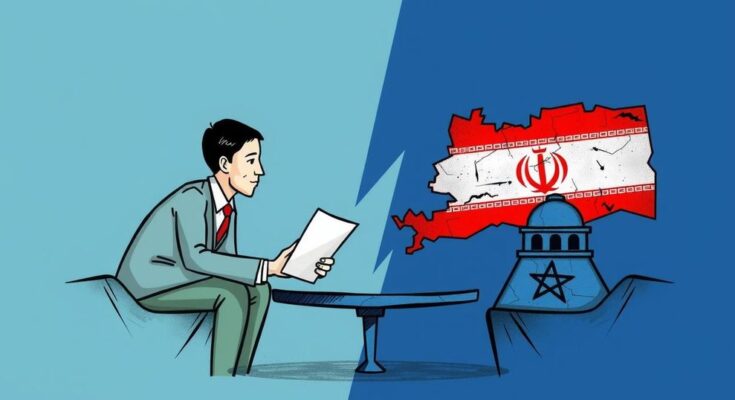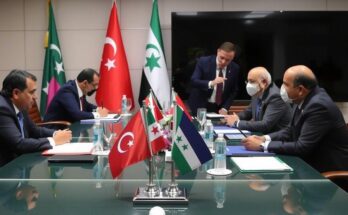The UN Security Council is scheduled to meet to address the situation following Israel’s strikes on Iran, requested by Iran with backing from several nations. The conflict has intensified following Iranian missile launches at Israel and subsequent Israeli military operations. The meeting aims to discuss the implications of these strikes and the ongoing violence in Gaza, alongside Egypt’s cease-fire proposal.
The United Nations Security Council is poised to convene an emergency meeting on Monday to deliberate the escalating tensions in the Middle East in light of Israel’s recent military actions against Iran. This meeting has been called at the behest of Iran, supported by Algeria, China, and Russia. Iran’s Foreign Minister, Abbas Araqchi, articulated concerns in a letter addressed to the council, asserting that the Israeli regime’s conduct represents a “grave threat to international peace and security” and exacerbates the instability of an already precarious region. The conflict escalated over the weekend when Israeli jets executed multiple strikes targeting Iranian missile production facilities, retaliating after Iran launched approximately 200 ballistic missiles towards Israel amidst ongoing conflicts involving Iranian-backed groups such as Hamas and Hezbollah. Iran’s Supreme Leader, Ayatollah Ali Khamenei, commented on the airstrikes, indicating that they should not be either exaggerated or dismissed, but notably refrained from advocating for retaliatory measures. This event marks Israel’s first publicly acknowledged strike against Iran, an archrival. Israeli Prime Minister Benjamin Netanyahu remarked that these military actions successfully diminished Iran’s defense capabilities and missile production capacity. In advance of the Security Council’s meeting, Iraq lodged a formal complaint with the U.N., condemning Israel’s infringement on its airspace during the attacks on Iran, thereby asserting its sovereignty. Further intensifying the situation, Israeli forces conducted additional airstrikes in southern Lebanon on Monday, resulting in the deaths of at least five individuals in Tyre, according to health officials. Simultaneously, Egyptian President Abdel-Fattah el-Sissi proposed a two-day cease-fire in the ongoing conflict between Israel and Hamas in Gaza, recommending that the militant group release four hostages amid the cessation of hostilities. However, neither Israel nor Hamas has publicly responded to this proposal. El-Sissi’s initiative aims to alleviate the humanitarian crisis in Gaza, calling for increased aid for the Palestinian populace. In negotiations for peace, Israeli Mossad chief David Barnea has traveled to Doha to engage with Qatari Prime Minister Mohammed bin Abdulrahman Al Thani and U.S. CIA chief William Burns. This recent wave of conflict originated following the Hamas attack on October 7, 2023, which resulted in the deaths of 1,200 Israelis and the capture of approximately 250 hostages. Israel has asserted that Hamas continues to hold 101 captives, approximately 35 of whom are believed to be deceased. In response, Israel’s military operations in Gaza have reportedly resulted in nearly 43,000 Palestinian casualties, according to the health ministry in the region, lacking distinction between combatants and civilians in its toll.
The geopolitical landscape of the Middle East has been increasingly fraught with tension, notably between Israel and Iran, fueled by longstanding hostilities and recent military engagements. The recent Israeli airstrikes against Iranian targets signify an escalation of direct confrontations, following Iran’s attacks on Israel and the ongoing conflict involving both Hamas and Hezbollah. The backdrop of this military aggression emphasizes the fragility of regional peace and the precarious balance of power, prompting concerns from global powers about potential ramifications for international security. The United Nations has increasingly found itself at the center of mediating disputes in the region, highlighting the urgency for diplomatic resolutions amidst escalatory actions.
In summary, the impending emergency meeting of the United Nations Security Council reflects the international community’s concern regarding Israel’s military actions against Iran, which have sparked a multifaceted crisis involving Iraq and discussions surrounding humanitarian aid in Gaza. The repercussions of these developments pose critical questions about regional stability and peace, underscoring the necessity for diplomatic interventions and sustained dialogue among the involved parties.
Original Source: www.voanews.com




